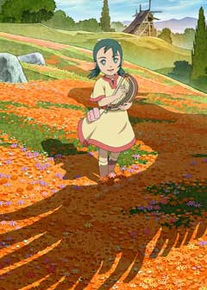Review
by Carl Kimlinger,Beast Player Erin
| Synopsis: |  |
||
In a small village in an ancient kingdom lives a young girl named Erin. Raised by her widowed veterinarian mother but ostracized for her foreign blood (her mother was born to a tribe of reclusive nomads), Erin is a bright and inquisitive girl. Her mother tends to the village's Tohda, huge dragon-like lizards upon which the military supremacy of their nation relies. It's an important job and Erin, like many children her age, wants to follow in her mother's footsteps. Her mother soon discovers that Erin has a frightening acuity for the work, and reluctantly—hers is a deadly dangerous job in more ways than one—begins to train her. Through time and tragedy, Erin advances steadily towards her goal, becoming fixated along the way with the Ohju—winged beasts that eat the Tohda and are raised as symbols of the royalty's dominion over the Tohda-welding armies that support them. Erin wants to study the Ohju, but unbeknownst to her, every step towards her goal is another step towards a destiny that may shift the very course of history. |
|||
| Review: | |||
There's nothing fancy about Erin. It's a well-thought-out children's fantasy centered around a pleasant and intelligent girl. Hardly spectacular, right? Wrong. Erin is something of a dinosaur, a throwback to the solidly written dramas of yesteryear: 100% irony-free, evenly paced, and not afraid to trust in the intelligence of its audience. It even has moments of abstract artiness that echo Osamu Dezaki's odder flights of fancy in Nobody's Boy Remi and it stalwartly avoids basically anything remotely objectionable. It doesn't get much more old-fashioned than that. Which is exactly Erin's charm. Gone are the accumulated years of mix ‘n’ match genre tropes and ADD bombast. Gone are the tried-and-true first episode hooks and fan-baiting gimmicks. Erin has an appealingly rough-hewn feel, as if its creators reached into the past and plucked a tale from a time when storytelling was still young. There's a myth-like simplicity to it, as well as an almost myth-like resonance. Something about its tale of a girl growing into her role as a historical linchpin strikes a primordial chord not struck since the overt mythologizing of The Twelve Kingdoms—though its home-spun, bottom-up approach stands in stark contrast to the latter's elaborate top-down pageantry. Not that Erin is simplistic or reductive. Far from it. The politics and history of the kingdom are detailed and firmly rooted in both human realities and very specific cultural circumstances—all of which influence the life of young Erin, who over the course of these twenty-five episodes evolves from a carefree girl into a grave and principled young woman. It's the kind of carefully-considered world-building/plotting that one would expect of a fantasy novel rather than the (and let's be honest here) fast and loose world of anime fantasy. Which is hardly surprising, given that the series is based on the eponymous novels of Morbito scribe Nahoko Uehashi. While the series' respect for its audience leaves it open for enjoyment by all age brackets, Erin's visuals firmly mark it as children's fare (children, not tots—though never objectionable, it has dark undertones and some shocking plot turns that will send wee 'uns scurrying for cover). The smooth, child-friendly character designs are the main tip-off, though the simple yet painterly backgrounds and entirely bloodless violence (carnage is communicated via abstract folk art) are also telling. The resultant look is actually well-suited (almost perfectly) to the series' fairy-tale ambiance—think Snow White by way of cave paintings and latter-day Osamu Tezuka. Erin's two sidekicks were an unspeakable mistake however (think Laurel and Hardy by way of Step'n Fetchit). The animation is rock-solid, though as Production I.G is involved, some intrusive CG showboating is inevitable. The showboating, however, is wisely confined to the actions of the Tohda and Ohju, adding to their majesty, menace and eerie unnaturalness. To complement the series' look, Masayuki Sakamoto composed a score of equal simplicity and directness. On top of fitting with preternatural precision into the series' overall ambiance, his work is also easy on the ears and at times downright beautiful. The real strength of the score, however, lies in the lovely insert songs—by ending artist cossami—and the recurring lullabies sung and played by a variety of characters throughout the show. The fantastic (in both senses of the term) opening and ending sequences don't hurt either. Ever since humans first evolved the power of speech, back in the far mists of time, the cardinal rule of storytelling has always been the same: tell a good story and people will listen. Erin, unlike far too may of its contemporaries, understands this. Its purpose is simple: to tell an interesting story and tell it well. Real people, a universal story, a developed background—these are the blocks upon which it builds its tale. It sneaks up on you rather than pouncing, weaving a seemingly solid spell that is as enmeshing as it is unassuming. And all without sacrificing its intelligence, its conscience, or its ability to move. Now that's spectacular. An undiscovered gem. |
| Grade: | |||
|
Overall (sub) : B+
Story : A-
Animation : B
Art : B+
Music : B+
+ A far-reaching yet somehow humble fantasy told without recourse to the usual anime gimmickry; balanced but loveable heroine. |
|||
| discuss this in the forum (26 posts) | | |||
| Production Info: | ||
|
Full encyclopedia details about |
||